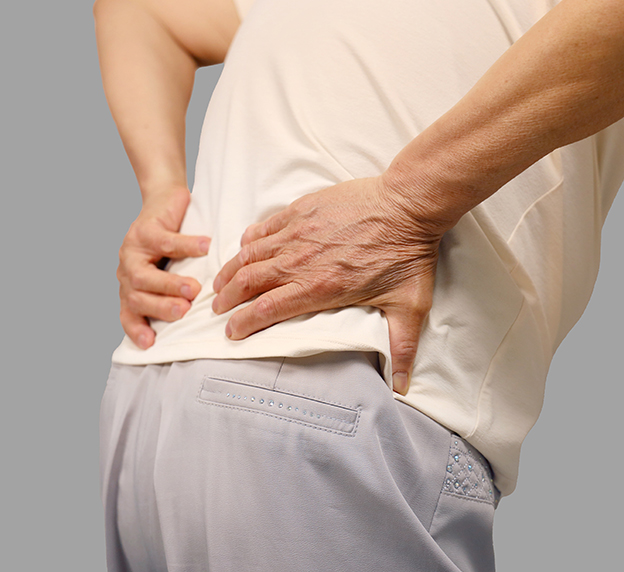
“Why do my hips hurt?” It’s a common question that becomes more common with age. If you find yourself asking it more than you used to, it’s probably time to check in with your primary care provider. The cause of your hip pain may not be your hips at all.
“Often patients will come in complaining of hip pain, and it turns out they are referring to their buttocks as the location of the discomfort,” says Dr. Vandit Sardana, a board-certified, fellowship-trained orthopedic surgeon at Beaufort Memorial Orthopaedic Specialists. “But if the pain is in your buttocks or some other area, it may not be a hip problem.”
Common Causes of Hip Pain
To understand the many causes of hip pain, it helps to understand the hip joint and its anatomy. The joint is located near your groin, where the thigh bone and pelvis meet. The hip is a ball-and-socket joint, the ball being the head of the femur and the socket being the pelvis. Those bones are connected by ligaments and surrounded by soft tissues and major muscle groups, including gluteal muscles, quadriceps and hamstrings. Other parts of the hip, including fluid-filled sacs called bursae and fluids that lubricate the joint, help the joint move.
Because the body is so interconnected, problems that develop in any bone, ligament, muscle or tendon in or around the hip can cause pain you feel in the hip.
Those problems can lead to some of these common causes of hip pain:
- Arthritis. Pain that starts in the groin area may be caused by arthritis. This chronic condition causes swelling and inflammation around the joints and often develops over time due to osteoarthritis, caused by wear and tear on the joint and the most common form of arthritis.
- Hip bursitis. If you feel pain on your hip’s outer side, hip bursitis may be to blame. Hip bursitis is inflammation of the bursae that cushion the hip bone. Hip injuries and overuse from activities such as running and walking can cause bursitis to develop.
- Hip fractures. Hip fractures, a break of the thigh bone where it meets the pelvis, frequently cause hip pain among older adults and those with osteoporosis. Most commonly resulting from falls, a hip fracture will cause sudden, intense pain, disrupting weight-bearing activities, including walking.
- Labral tears. The labrum is the soft tissue that covers the hip socket. When it tears due to injury or another cause, it can lead to pain and stiffness in the hip. If a labral tear occurs, you will likely also experience discomfort in the buttocks and groin, along with a clicking sensation in the hip area.
- Spine problems. If your hip pain radiates into your back and buttocks, it can be a problem with the spine, like a pinched nerve.
- Tendinitis. Tendinitis can cause pain where your hips connect with your buttocks. The condition is caused by inflammation of the tendons that connect the buttocks to the hip bone and is a common cause of acute hip pain.
Read More: Having a Total Hip Replacement? Here’s What to Expect
Finding a Solution for Hip Pain
Although knowing the location of your pain is helpful, according to Dr. Sardana, your orthopedic specialist will still want to diagnose the cause, most likely with an imaging study, such as an X-ray, MRI or CT scan. Your provider can determine the most appropriate treatment plan with an accurate diagnosis.
In many cases, you may only need over-the-counter anti-inflammatories or prescription medications to relieve pain. Your care team may also recommend physical therapy to help you work on exercises and stretches that strengthen the muscles in your hips, back and legs that can contribute to pain. Other treatment options for hip pain may include oral or injected medications, rest and massage.
Read More: What You Need to Know About Cortisone Injections
If a hip injury is to blame, treatment will include correcting the issue and allowing it to heal. A hip fracture, for example, typically requires surgery and physical therapy.
When arthritis causes the hip joint to degenerate, leading to chronic pain and instability, your orthopedic surgeon may recommend a hip replacement to replace the ball-and-socket joint in the hip with artificial components.
Don’t Ignore Your Hip Pain
Whether due to a problem in your hip or one of the many nerves, muscles and tendons surrounding it, hip pain is a treatable problem, provided you seek help. With increasingly sophisticated treatments available, your provider can recommend the right treatment option to prevent hip pain from slowing you down.
Have a hip that’s a pain? Request an appointment with an orthopedic surgeon who can get to the root of the pain and offer a solution.

